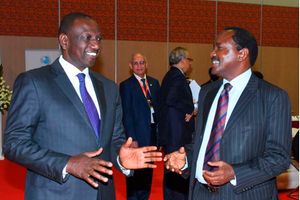Premium
What’s the treatment for failing to ‘turn up’ in bedroom?

What you need to know:
- It would be advisable to be reviewed by a psychologist and an urologist.
- Also, maintain healthy weight, exercise regularly, get adequate sleep (seven to eight hours a day), avoid alcohol and cigarettes, and find a way to manage stress.
Dear Doc,
What are the treatments of a person having Erectile Dysfunction problems? Recommend the best health care centre to visit
Dominic
Dear Dominic,
Having a problem with achieving an erection once in a while is not a cause of concern. You may have low libido, which means there is a decrease in desire for sexual activity, which can lead to a problem with achieving an erection. If it persists, then there is erectile dysfunction. It may be due to psychological issues caused by relationship issues, performance anxiety, stress, anxiety, depression, excessive masturbation, among others. You may also have a physical problem that is affecting the quality of your erections such as nerve disorders, diabetes, hypertension, high cholesterol levels, blocked blood vessels, obesity, alcoholism, smoking or other drugs, reduced testosterone levels and heart disease. Some hypertension medications can cause delay in achieving erections, and also with advancing age, it may take longer to achieve an erection.
It would be advisable to be reviewed by a psychologist and an urologist. You can get an urologist at any of the big public and private hospitals. Also, maintain healthy weight, exercise regularly, get adequate sleep (seven to eight hours a day), avoid alcohol and cigarettes, and find a way to manage stress. If you have any other chronic illnesses, then they need to be managed well.
You may also benefit from pelvic floor exercises: contract the pelvic muscles for about 10 seconds, 10 times in one set, six to 10 sets in a day. To identify the specific muscles, stop the urine mid flow when you are urinating.
Hello doctor.
Does an ovarian cyst hinder conception?
Lilian
Dear Lilian,
An ovarian cyst is a sac with fluid or semi-solid contents found in or on the ovaries. The cysts are quite common and, in most cases, have no symptoms and resolve by themselves without intervention. There are two types of cysts – functional and non-functional cysts.
Functional cysts form as part of the normal cycle and usually have no symptoms and resolve by themselves within three months. The ovaries usually release one egg/ovum each month.
This egg develops within a follicle, and is released during ovulation. If the follicle does not break open to release the egg, then it forms a follicle cyst, which usually resolves by itself. Another type of functional cyst is the corpus luteum cyst. This forms if the follicle doesn’t shrink after releasing the egg during ovulation.
The cyst may persist and even bleed and cause pain. The corpus luteum cysts are more likely to form if the person becomes pregnant.
Non-functional cysts can develop because of other health concerns like polycystic ovarian syndrome (the ovaries have many small cysts, and there is a hormonal disorder), endometriosis (growth of endometrial tissue in places outside the inner uterine lining), pelvic inflammatory disease (infection within the pelvis) and some cancers.
Complications of having a cyst are rare and usually arise if the cyst is very large or if there are other health issues. Complications include pain, bleeding, ovarian torsion (twisting of the ovary), rupture and infection.
Functional ovarian cysts do not affect fertility.
However, polycystic ovarian syndrome can affect fertility. In polycystic ovarian syndrome, the ovary has many cysts containing immature eggs that do not reach the stage of ovulation. Hormone levels are altered, which disrupts the menstrual cycle. Extra androgen hormones (testosterone) are also produced. The symptoms include irregular periods, heavy bleeding, acne, excessive hair growth, weight gain, hair loss on the scalp, and dark patches on some areas of the skin. Because ovulation rarely happens, it is difficult to conceive.
If you suspect you have polycystic ovarian syndrome, please visit a gynaecologist. You can get medication to induce ovulation for several cycles to see if conception will happen. If it doesn’t, the other options include intrauterine insemination (IUI) and in vitro fertilisation (IVF).
Daktari,
I am 24. I sustained a serious knee injury back in 2017 while playing soccer. From the x-rays, no bone had fractured. Through physiotherapy sessions, I healed well and resumed playing. Unfortunately, in May this year, I sustained another injury in the same left knee by wrong landing while sprinting. But no bone was fractured and in-fact, I walked well and was assigned physiotherapy sessions and RICE method to heal but after six months, the knee had not regained its stability, which prompted the doctor to request MRI scans that showed suspected ACL tear. Can the ACL tear heal through rehabilitation or I have to undergo an operation?
Simon
Dear Simon,
The anterior cruciate ligament (ACL) is one of the four ligaments that provide stability to the knee. A ligament is a strong band of connective tissue connecting one bone to another, in this case, connecting the thigh bone to the shinbone.
ACL injury, either a sprain or a tear, is common in sports that require sudden stops, sudden changes in direction and jumping such as football, rugby, basketball, gymnastics and skiing. When there is a tear, you may hear or feel a “pop” at the knee, followed by pain, rapid swelling, reduced range of motion and knee instability.
Rehabilitative therapy is used for ACL injuries, including the RICE method – rest, using ice packs, compression and elevation.
However, an ACL tear cannot heal by itself. If you want to continue with sports or if the knee is unstable during everyday activities, or if there are multiple tissues that are torn, then you would benefit from surgical reconstruction followed by rehabilitative management. It is crucial to get assessment for stability before resuming sports due to risk of re-injury, like what happened before. Multiple injuries cause further instability and raise the risk of developing osteoarthritis.
Send your health questions to[email protected]




